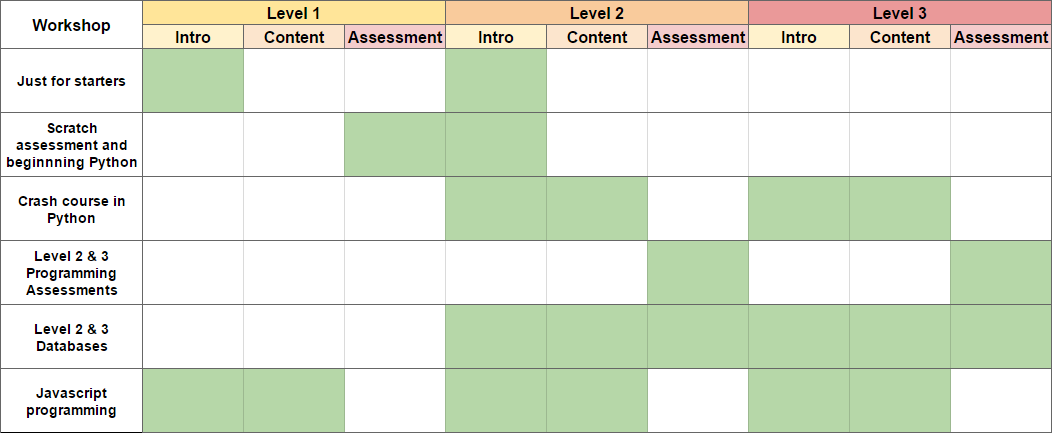Workshops
This year we are offering several different workshop streams to accommodate a wide range of interests and skill levels. The page aims to teach you more about these streams, so you can make an educated decision on which workshop is best for you to attend. Check the timetable for dates and times for the workshops.
Computer Science Workshops
The CS workshops are split into two groups:
Introduction Workshop
For those who have never used the computer science standard before. We will go over the purpose of this standard, and show some examples of how to get students engaged with the ideas in it.
Assessment Guide Workshop
For those who have been exposed to the content of a computer science standard and want a guide through the assessment side of the standard.
Analysis Workshop
For those who wish to learn about the content to teach the standard (or maybe want to go over the basics again), and a second stream for those who have had some experience with the standard. It will be a chance to share best practice ideas, and get ideas from others on how to deliver parts that have been a challenge for your students.
Mini-Unconference
In an Unconference, attendees and presenters converge on topics of mutual interest that they would like to discuss or learn more about. It's also a chance to spend more time on topics from earlier sessions if there's interest.
Information about unconference streams will be available during the conference.
Programming Workshops
The programming workshops for this year are being run slightly different to last year. Last year the workshops were quite distinct topics, however this year there is quite a lot of overlap in some courses so you don't need to switch between courses. For example, if you wish for an introduction to programming, the "Just for starters" workshop is best for you, however if you have mastered Scratch and want to start learning Python, the "Scratch assessments and beginnning Python" workshop is better suited for you. Check the diagram and descriptions below for an explaination of workshop coverege.

Please note: Programming takes weeks to learn properly, but these will give you a good idea of what is involved, and pointers to what to do next to become confident with the content.
Just for starters
For those with absolutely no experience, programming concepts are taught gently using Scratch and Python at the same time. Intended for those with no programming experience, this session will mainly orient you around what is available, and give information on how to get up to speed in programming.
Scratch assessments and beginning Python
Investigate the assessments for Scratch at level 1, and look into beginner Python concepts. This course is aimed for those who wish to discuss the assessment for Scratch, and spend a little time looking at Python and how it can follow on from Scratch
Crash course in Python
For those who are ready to take on a text based programming language, this session will take you quickly through an introduction to Python to the point where you have written a working program. Programming takes weeks to learn properly, but this will give you a good idea of what is involved, and pointers to what to do next to become confident with the language.
Level 2 & 3 Planning & Programming Assessments
For those who are comfortable with programming in a text based programming language (Python, JavaScript and Java are the most popular in NZ), this session will pick apart the level 2 and 3 standards on planning and programming. It will be a chance to share best practices and assessment ideas.
Level 2 & 3 Databases
If you don't need help with programming, but would like to look at databases (which fall under the Information Systems strand), this session will cover important parts of achievement standard 2.41 (AS91368): "designing and constructing a database" with a well-organised table structure, relational database design, "using tools of the software to integrate data from a database..." The second session (on Thursday) will cover 3.41 (AS91633): "creating queries which combine data from multiple tables" (joins in SQL), and "creating queries which insert, update or delete to modify data" (CRUD). In addition to these we can discuss assessment criteria, examples and resources available to help teach databases to High School students.
Programming 2D Games with JavaScript
CodeAvengers have developed a new lessons in which students build 2D graphical games as they learn the computer programming concepts for 1.46-3.46. In this workshop, you will cover how to teach and assess 1.46 using the Code Avengers level 1 game development lessons. There may be an opportunity to move onto an overview of the level 2 and 3 game development courses. Teachers will get to build a couple of their own games during the session. These lessons are also suitable for digital media, or junior programming courses. Please bring headphones to this workshop to hear game sounds (this is optional).